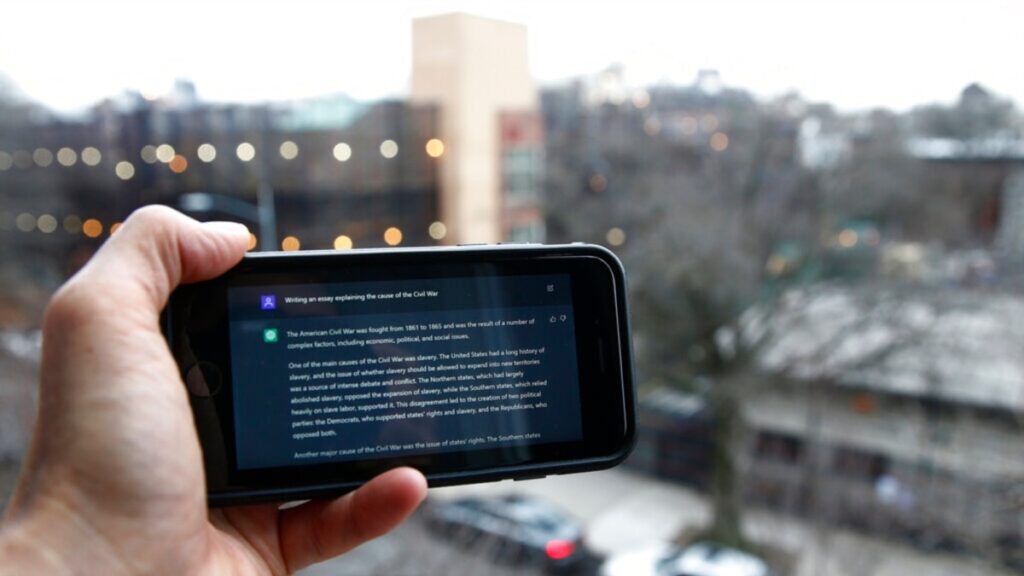Synthetic intelligence is rapidly turning into a part of our social media world on our cellphones and computer systems. Textual content, photos, audio and video have gotten simpler for anybody to create utilizing new generative AI instruments.
As AI-generated supplies grow to be extra pervasive, it is getting more durable to inform the distinction between what’s actual and what has been manipulated.
“It is one of many challenges over the subsequent decade,” mentioned Kristian Hammond, a professor of pc science who focuses on synthetic intelligence at Northwestern College.
AI-generated content material is making its manner into motion pictures, TV exhibits and social media on Fb, TikTok, Snapchat and different platforms.
AI has been used to alter photos of former President Donald Trump and Pope Francis. The winner of a prestigious worldwide photograph competitors this 12 months used AI to create a faux photograph.
Victor Lee, who focuses on AI as an affiliate professor within the Graduate College of Training at Stanford College, mentioned, “individuals have to train warning when AI-generated supplies.”
Whether or not it is textual content, video, a picture or audio, with generative AI we’re seeing issues that seem like precise information or a picture of a specific particular person nevertheless it’s not true, Lee mentioned.
AI can be getting used to create songs that sound like fashionable musical artists and replicating photos of actors.
Just lately, an nameless particular person on TikTok used synthetic intelligence to create a music with a beat, lyrics and voices that fooled many individuals into believing it was a recording by pop stars Drake and The Weeknd.
“I feel the Avatar motion pictures have been so profitable as a result of individuals have been capable of establish with the animation of the simulated characters,” mentioned Bernie Luskin, director of the Luskin group school management initiative on the College of California, Los Angeles.
SEE ALSO: ‘Avatar 2’ Makes Waves With $134 Million Home Debut Luskin, who does analysis on media psychology, thinks that as using AI turns into a worldwide phenomenon, it’ll have an effect on individuals psychologically and affect their habits.
“It is positively going to have a dramatic affect on social media,” he mentioned. “As AI turns into extra frequent, it’ll grow to be more and more misleading, and abusers will abuse it.”
On a constructive word, Hammond mentioned AI will promote extra creative parts.
“We’ll have a brand new view of what it means to be artistic,” he mentioned, “and there will probably be a distinct sort of appreciation as a result of the AI programs are producing issues in partnership with a human.”
A significant concern, nonetheless, is that individuals are already being duped by AI, and because the expertise turns into much more subtle, will probably be much more tough to discern its imprint.
Krishnan Vasudevan, assistant professor in visible communication on the College of Maryland, worries that folks could grow to be proof against AI-generated supplies and will not care if they’re actual or not.
“They’re going to be wanting visuals that reinforce their viewpoints, they usually’ll use the software as a approach to discredit or make enjoyable of political opponents,” he mentioned.
SEE ALSO: US Communications Fee Hopeful About Synthetic Intelligence Specialists say norms, laws and guardrails have to be thought-about to maintain AI in line.
“Does AI obtain credit score as a co-author?” Lee requested.
“I feel there will probably be authorized battles about utilizing anyone’s voice or likeness,” Vasudevan mentioned.
“Now we have to start out wanting exhausting at precisely what goes on the market,” mentioned Hammond. “For instance, there ought to be laws that say your picture shouldn’t be related to something pornographic.”
Lee mentioned synthetic intelligence will create massive adjustments the general public will get used to, very similar to the Web and social media have executed.


